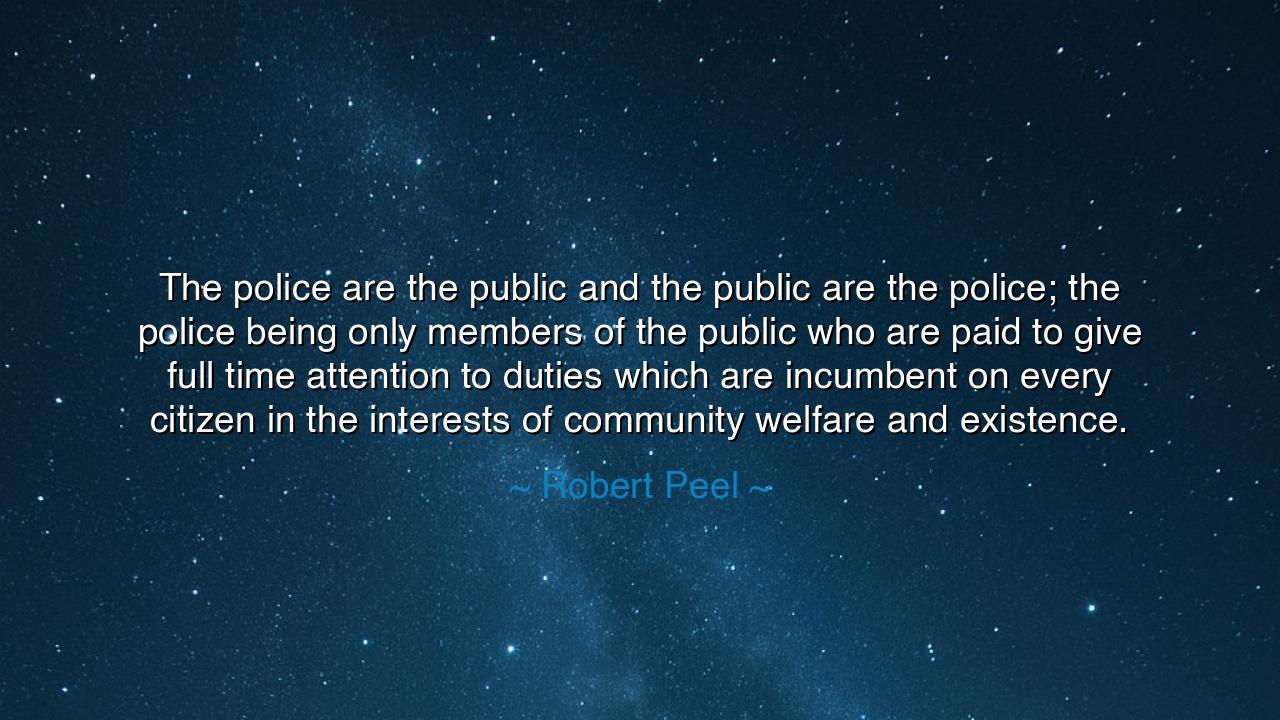
The police are the public and the public are the police; the
The police are the public and the public are the police; the police being only members of the public who are paid to give full time attention to duties which are incumbent on every citizen in the interests of community welfare and existence.






Sir Robert Peel, father of modern policing, spoke with clarity that has echoed through the centuries: “The police are the public and the public are the police; the police being only members of the public who are paid to give full time attention to duties which are incumbent on every citizen in the interests of community welfare and existence.” These words, though spoken in the nineteenth century, ring with timeless truth. They remind us that authority does not descend from the heavens, nor from crowns, nor from uniforms—it is rooted in the people themselves, for the guardians of law are nothing more than citizens entrusted with a sacred duty.
The meaning of this declaration is both humbling and profound. The police are not meant to stand apart, as rulers or enforcers, but as fellow members of the public. Their power does not spring from force alone, but from the trust and consent of the people they serve. Likewise, the public must not see the keeping of peace as a burden cast off to others, but as a shared responsibility. For law and order are not upheld only by badges and oaths, but by the daily conduct of ordinary men and women who act with integrity in the interests of the community. Peel’s words unite both sides: the uniform and the citizen are two faces of the same body, each bearing responsibility for the welfare of all.
The origin of this teaching lies in Peel’s reforms in London in 1829, when he founded the Metropolitan Police. At that time, the image of police was feared—agents of tyranny, spies of kings, tools of oppression. To counter this distrust, Peel crafted his famous Principles of Policing, of which this quote is a jewel. He sought to establish that the police exist not to oppress the people, but to protect them, and that they are of the people, not above them. His vision was revolutionary: guardians who earn legitimacy not by power alone, but by moral authority, restraint, and service.
History gives us examples of when this truth has been honored—and when it has been betrayed. In communities where police have stood with the people, peace has flourished. During natural disasters, when officers and citizens alike have worked side by side, rescuing, feeding, and rebuilding, Peel’s principle shines forth: there is no separation, only one body serving itself. But when police have forgotten their identity as part of the public—when they have become instruments of tyranny or corruption—they have sown division, and the bond of trust has shattered. Nations have learned, through blood and sorrow, that Peel’s wisdom cannot be ignored.
The lesson for us is urgent: do not think of peace as someone else’s burden. Every citizen is responsible for the safety, fairness, and dignity of their community. Whether you wear a uniform or not, you are called to act with justice, to intervene against wrong, and to uphold the bonds that hold society together. And for those who do wear the badge, never forget that authority is not license—it is stewardship, drawn from the very people you serve. Without their trust, your power is an empty shell.
Practical wisdom flows from this. As citizens, we must engage in the welfare of our communities: look after neighbors, resolve conflicts with patience, respect the law, and demand accountability from those entrusted with power. As officers, one must serve with humility, remembering always: “I am the public.” Stand not apart, but among, as protector and fellow human. By embodying this truth, trust is built, and through trust, peace becomes possible.
Thus Peel’s words remain as a beacon for generations: “The police are the public and the public are the police.” Let us carry this truth as a shield against division. For the survival of society depends not on force alone, but on unity—citizen and guardian, hand in hand, sharing the burden of justice, bound by the common good. And in this unity lies not only safety, but the very existence of community itself.






AAdministratorAdministrator
Welcome, honored guests. Please leave a comment, we will respond soon